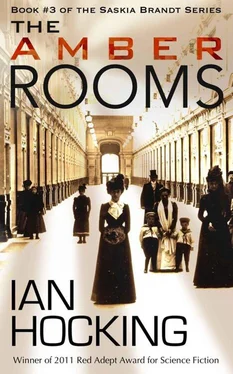‘We will give it to him together, as we had planned.’
Saskia wiped her mouth with a napkin. At once, Kamo gripped her gloved wrist. His grin was broad in deference to the onlookers but, up close, it trembled with the effort of clamping Saskia’s bones.
‘I wonder,’ said Kamo.
‘What?’ she replied, playing indifferent.
‘Did that agent, Draganov, turn you after all? Have you been telling lies to your old friend, Kamo?’
‘What do you think?’
Kamo held her stare for a long moment. Then he released her hand and turned to the menu. ‘To whom does one give one’s trust? That is the question of today, and every day.’
To whom.
That word, Кому , was the pronoun he could not correctly modify as a child. Kamo. Like camouflage , she thought, drinking him in. With it, an identity. Brigandage, murder and high talk. Those skirted coats. Laughter and piracy. Princes without money. Dust. Milk.
‘But, of course,’ said Kamo, ‘I believe you. That is faith, after all, and faith cannot be the preserve of the zealot.’
Saskia touched the band at her left elbow, one constant companion among so many. The train passed into a tunnel and a red gloom came to the carriage. The imperfect light of dusty bulbs could not match the sun.
Russia was there. It waited to open up and to drink her in.
Kamo leaned forward in the murk. His good eye wavered as though it had lost track of her. Criminal; master of disguise; bore. Par for the revolutionary course.
She raised her eyebrows and drank more of the wine.
After many countries and many trains, Saskia and Kamo were passing through the last of the taiga south of St Petersburg. Low sunlight flashed. Late Russian spring: water everywhere, the chill at ebb. Saskia stood at the window of her compartment and leaned against the slowing of the carriage. The hood of the station roof was grey-black through the dripping window. Saskia was in no hurry. She watched the platform fill with people. She noted that the speed of an individual was correlated to his or her class. The moneyed were slow; the poor like oil, greasing them.
Kamo looked at her from his bed. He was awake. A clicking in his throat suggested that he was choking, so Saskia rolled him onto his front and tipped his head. He coughed. One eye turned to her. Its pupil was a bloodspot in an egg.
‘I once knew another Simon,’ she said. She paused. There was a sense of repetition. Had she said this before, in a dream? ‘He was not real. Are you real?’
Moving with the air of an artist adjusting her work, she unbuttoned his jacket and shirt. She took some port from a cabinet and wetted his beard and throat. Then she poured his half-drunk, poisoned wine onto the centre of the floor, in case a servant was tempted by it. She put the bottle on the floor.
Let ten seconds pass. Do not appear to flee.
‘Bitter, is it not? The fungus is called the Destroying Angel.’
He could not speak, or would not.
‘You thought I needed you. I don’t.’
A train whistle, short, echoed through the station and spoke of other journeys. Saskia left the compartment. But at the steps, she paused, then returned to Kamo.
‘You saved my life,’ she whispered. ‘So the poison is not mortal. You will recover with no ill effects. I said it was the Destroying Angel, but that was a lie to finesse the trick.’
Kamo growled.
‘My dear?’ she asked.
He was unconscious. Resting at last.
~
Travellers came to Nicholaevsky Station from Central and South Russia, from Siberia, Eastern Ukraine, and the Crimea. Chains hung from its high arches like funeral crepe. There was something opera about this place. A dwarf approached Saskia with a tray of tea and chocolate. She shook her head. Corinthian, too: the columns. The dwarf raised his hat and continued along the platform. Behind her, a train whistle blew a minor chord. Old women bent like ships under full sail. Gents placed the points of their umbrellas as they walked. Others wore scuffed, tilted hats in great variety. A man must have a hat. A child dashed a zigzag, powered by flippers of torn newspaper. The wealthier children wore knickerbockers and cloth caps: English, but the cuts suggested Russian interpretation. Waxed whiskers. Gypsies selling honey and flowers. An old man, holding his bleeding nose, looking for a culprit. A younger man, offering the flat of his hand to the air, frowning at the ceiling.
Saskia was a quiet island. She sighed. The expansion strained at her corset.
A woman screamed. Saskia turned. The woman was spinning a boy in her arms, delighting in his weight, while an embarrassed father looked at both of them with a pleasure that made Saskia hurt. Her pain disappeared when she heard something almost below the threshold of her hearing.
Is.
It.
Her.
The head of the platform was intermittently obscured by steam. Something inside Saskia isolated a frequency band near the microwave spectrum and showed her what was beyond the steam: two men. One appeared to be looking at her, when he could only be looking at the steam. His expression was anxious. He was either a secret policeman, which made her a suspect for the attack on Draganov, or from the Party, which made her a traitor. Either way, she had to lose him directly.
Saskia beckoned to an attendant. He was an old fellow, stooped and with bad hips. She asked him to send her two hand-cases ahead to a hotel on the English Quay, which was some miles east. The man had a capable air. Saskia was glad of it. With luck, resources from her surveillance team would be diverted to the luggage. As for that, she did not expect to see it again, and did not care.
The attendant lifted each of her cases and began to walk along the platform. Saskia maintained a position three metres behind him. Her right hand and left wrist were covered by her muffler. She breathed steadily and prepared herself to administer a short, vicious attack. They passed through the wall of steam. If the waiting gentlemen were surprised, their training belied this. They communicated their confusion with a single look. Neither reached for her. Indeed, the four of them parted to let her through. Saskia lifted her head and gazed imperiously from left to right. In that instant, she made a catalogue of their every detail. One of them wore a green ex-army greatcoat, which was so obvious as apparel for Security Section employees that revolutionaries often called them ‘Green coats’.
The attendant turned left. Saskia turned right. The attendant had not seen her manoeuvre. He continued his wobbly gait into the crowd. Saskia mixed with the people on the concourse. It was heavy with foot traffic. Saskia walked randomly, as though looking for a friend. She observed the crowd in boutique windows, in unlit lamps, and patches of the floor made glassy by passing feet. From these observations, she identified three further Security Section agents: a young woman selling roses; a gentleman in a top hat carrying the Petersburg Gazette ; a second man, dressed as a clerk. They formed a triangle that was pure Security Section. There was no sign of the two men who had watched her from the head of the platform.
Saskia emerged onto Snamensk Platz. She narrowed her eyes in the smog, which was curiously bright at this time of day, and looked through the traffic of omnibuses and horse-drawn carriages to a poster box on the far side of the square. She walked towards it. Her steps were swift and she passed through the intersecting vehicles and cyclists with the confidence of a full-blooded Petersburger. When she had reached the poster box, she pretended to inspect a flyer for a student performance of Il barbiere di Siviglia at the Mikhailovsky Theatre, but instead watched the reflections of the Security Section agents in the windows of a jewellery shop on the corner of Ligowskaja.
Читать дальше












